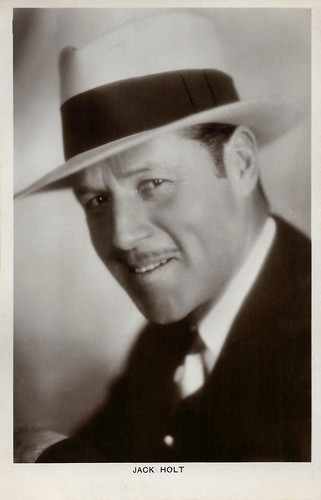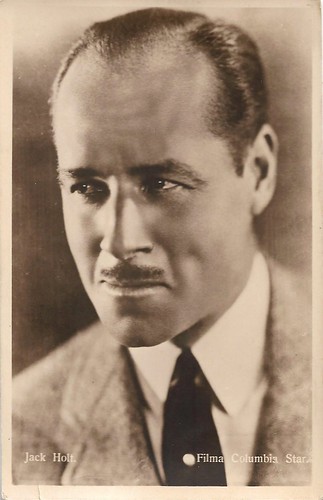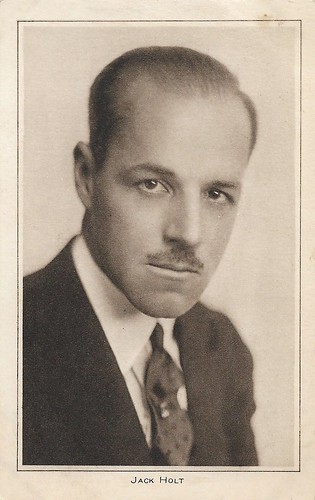
British postcard in the Picturegoer Series, London, no. 163b

Collectors card. Photo: Columbia. Jack Holt, Lila Lee, and Ralph Graves (left) in Flight (Frank Capra, 1929).

Dutch postcard by JosPe. Photo: Filma / Columbia.

British postcard in the Film Partners Series, London, no. PC 112. Photo: Columbia. Jack Holt and Fay Wray in Master of Men (Lambert Hillyer, 1933).

British postcard. Photo: 20th Century Fox. Shirley Temple and Jack Holt in The Littlest Rebel (David Butler, 1935).
Dapper moustache, prominent jaw, and quick-with-his-fists manner
Jack Holt was born Charles John Holt Jr in 1888.
From 1914, Holt started as a stuntman and bit actor in crime films and serials at Universal, first in the serials by Francis Ford such as The Master Key (Robert Z. Leonard, 1914) and The Broken Coin (Francis Ford, 1915).
The first major supporting part Holt had was as Conde in The Dumb Girl of Portici (Phillips Smalley, 1916), starring Anna Pavlova, while he had a lead in the Marie Walcamp serial Liberty (Jacques Jaccard, Henry MacRae, 1916), the first Western serial.
After more supporting parts he had the male lead in the Jesse Lasky production Sacrifice (Frank Reicher, 1917), distributed by Paramount. Even more important was his male lead in the Mary Pickford WWI vehicle, The Little American (Cecil B. DeMille, 1917), in which both French and Germans are not presented very sympathetically. Holt plays a half-German American who has to fight for Germany in France, while his American girlfriend (Pickford), reluctantly, helps the French. Eventually, they manage to escape back to the US.
Thanks to this and other male leads or important supporting parts at Lasky/Paramount, Jack Holt rose to stardom in the late 1910s and remained so all through the 1920s in films such as The Squaw Man (Cecil B. DeMille, 1918), The Life Line (Maurice Tourneur, 1919), Midsummer Madness (William DeMille, 1921), The Call of the North (Joseph Henabery, 1921), George Fitzmaurice’s 1923 remake of The Cheat with Pola Negri, etc.
In the mid-1920s Holt did a whole string of Western features for Paramount, often with Lois Wilson as co-actress, such as North of 36 (Irvin Willat, 1924). As Wikipedia writes, in the late 1920s "with his dapper moustache, prominent jaw, and quick-with-his-fists manner personified rugged masculinity."

American Arcade card. Dedication: Sincerely Yours - Jack Holt.

American Arcade card by Ex. Sup. Co., Chicago. Photo: Famous Players-Lasky. Jack Holt, Ann Little, and Elliott Dexter in The Squaw Man (Cecil B. DeMille, 1918).

French postcard. Photo: Les Films Paramount.

British postcard in the "Pictures" Portrait Gallery, London, no. 104.

British postcard in the "Pictures" Portrait Gallery, London, no. 104.
An enduring member of the cowboy fraternity
In 1928 Jack Holt moved over to Columbia Pictures, where he became the most reliable leading man and scored personal successes in three Frank Capra action dramas: Submarine (1928), which was released in both a silent and a sound version - of which the silent version was found at the Amsterdam Filmmuseum EYE, Flight (1929) and Dirigible (1931).
Yet, in the early 1930s, Jack Holt's no-nonsense characterizations were gradually eclipsed by younger, tough-talking actors like James Cagney and Chester Morris, although he was still entrusted with tough-guy-with-a-heart-of-gold leads.
Two mid-1930s features, Whirlpool (Roy William Neill, 1934), and The Defense Rests (Lambert Hillyer, 1934), starred Holt opposite up-and-coming ingenue, Jean Arthur. Exhibitors had come to associate Jack Holt with rough-and-tumble action, and so Holt continued to work in low-budget crime dramas, mostly for Columbia, through 1940.
The series came to an end when he argued with studio chief Harry Cohn, who thought the actor was so arrogant that he assigned him the leading role in a lowbrow serial. Holt turned in a professional performance in the serial but then walked out on both Cohn and Columbia and began freelancing at other studios, frequently appearing in outdoor and Western fare.
He would become an enduring member of the cowboy fraternity through Trail of Robin Hood (William Witney, 1950), a Roy Rogers Western with guest appearances by Holt, Allan Lane, Tom Keene, Tom Tyler, Kermit Maynard, and Rex Allen. Jack Holt's children Tim and Jennifer also had careers as actors.

French postcard in the Les Vedettes de Cinéma series, by A.N., Paris, no. 4. Photo: Film Paramount.

French postcard in the Les Vedettes de Cinéma series by A.N., Paris, no. 106. Photo: Film Paramount.

British postcard in the Girls' Cinema series, 1922.

French postcard by Editions Cinémagazine, no. 116.

Belgian postcard by Uitgave Weekblad Cinema, Antwerpen.

British postcard in the Picturegoer Series, London, no. 163.
Sources: Jim Beaver (IMDb), Wikipedia, and IMDb.
No comments:
Post a Comment